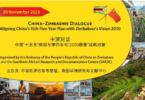The Southern African Research and Documentation Centre (SARDC) and the Chinese Embassy in Zimbabwe jointly organized a three-day Symposium in Harare from 22-24 October 2013 with the theme
“Fifty Years of China-Africa Cooperation: Background, Progress & Significance – African Perspectives on China-Africa Relations and the China Development Experience.”
The China-Africa Symposium was conceived as a sequel to a similar seminar with Chinese Perspectives that was hosted in 2009 by the Institute of African Studies at Zhejiang Normal University (IASZNU) and the Shanghai Institutes for International Studies (SIIS), involving all of the major institutes of African Studies in China, with the theme “Fifty Years of Sino-Africa Cooperation: Background, Progress & Significance – Chinese Perspectives on Sino-Africa Relations.”
The objective of the China-Africa Symposium hosted by SARDC and the Chinese embassy in Zimbabwe was to contribute to strengthening development and unity in Africa through sharing experiences and perspectives of development, and through better understanding of the Chinese development experience, as well as to facilitate closer contact through people-to-people interaction. The China-Africa Symposium held in 2013 also commemorated the 50th anniversary of the Organization of African Unity (OAU)/African Union.
The participants from China and 16 African countries were invited to present some of the issues and perspectives, and discuss ways in which this strategic partnership can benefit the peoples of China and Africa and their economies, and strengthen relations between them. The Symposium, organized by SARDC through its new Institute for China Africa Studies in Southern Africa (ICASSA), also focused on the emerging issues and challenges of regional integration in Africa and how China can engage with these.
Deliberations were divided into daily sub-themes as follows:
• Day 1: China-Africa Cooperation, focusing on achievements of the past 50 years of development; and influence on international relations;
• Day 2: Experience of China’s Development, focusing on policy, governance and peace; economy including agriculture, industrialisation, trade and infrastructure development; and diplomatic practice;
• Day 3: Africa’s Development Prospects, focusing on perspectives of the relationship between China’s development and Africa’s development; and current challenges and the future.
More than 100 participants attended the symposium including scholars, government officials and policy-makers from China and Africa, including men, women and youth. Papers were presented by 6 professors from China, and more than 30 scholars from Africa. The African scholars came from southern, eastern and west Africa, including Botswana, Malawi, Mozambique, Namibia, South Africa, Zambia and Zimbabwe, as well as Ethiopia, Kenya, Nigeria and Senegal.
The organizers gratefully acknowledge the financial support of the Forum on China-Africa Cooperation (FOCAC) for this initiative, through the China-Africa Joint Research and Exchange Programme. FOCAC was established by Chinese and African leaders at their inaugural summit in 2000 to chart a new type of strategic partnership, and they continue to meet at regular intervals to review progress and discuss future plans.
China and Africa share many similar historical, geographical and demographic characteristics. However, for policy development and implementation, China is better able to coordinate as it is a unitary state of more than 1.3 billion people, while Africa is a continent of1 billion people in 55 different countries with varying policy mechanisms, aspiring to the integration of fragmented economies to achieve economic development.
Cooperation between China and Africa continues to grow as does the volume of trade. The two-way trade between China and Africa has increased rapidly from about US$10 billion in 2000 to more than US$198 billion in 2012, according to the latest white paper on China-Africa economic and trade cooperation released in August 2013 by the Chinese government. Between 2009 and 2012 alone, China’s direct investment in Africa rose from US$1.44 billion to US$2.52 billion at an annual growth rate of 20.5 percent.
This is despite the global financial and economic downturn that affected the world since 2008 and saw some of Africa’s traditional economic partners either withdrawing or reducing their support to the continent. The development of the People’s Republic of China (PRC) has been a remarkable achievement in terms of its rapid pace and global impact. What lessons can be drawn from the development experience in China to accelerate the African integration agenda?


